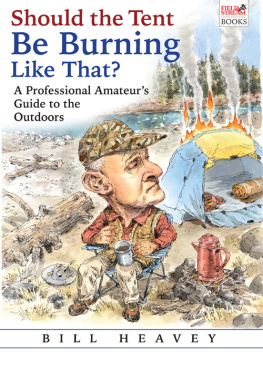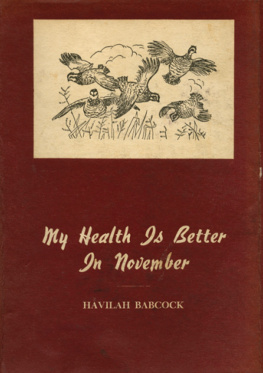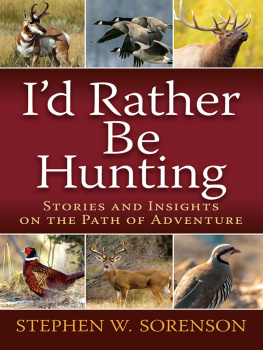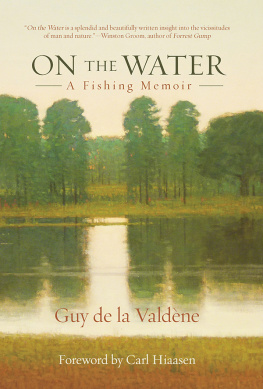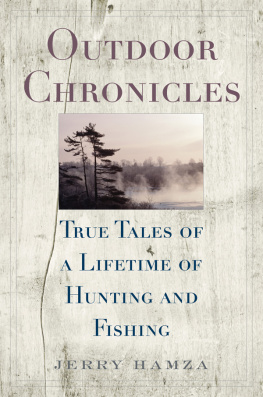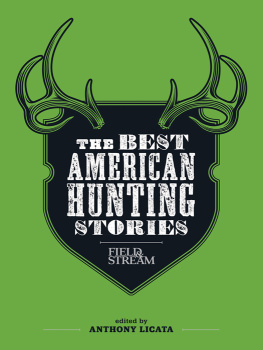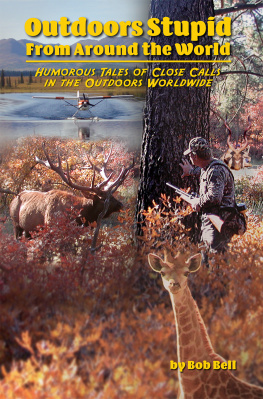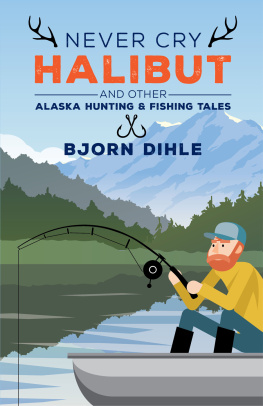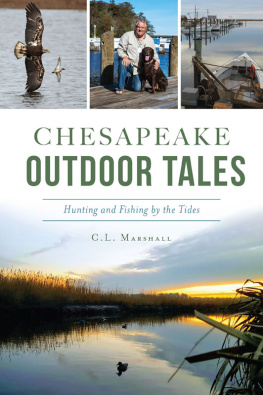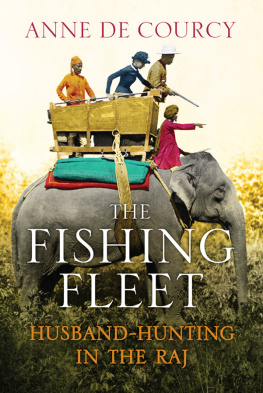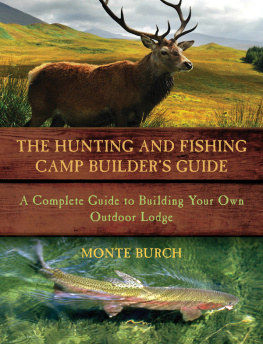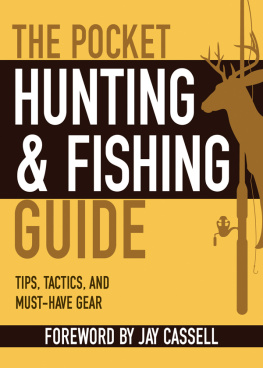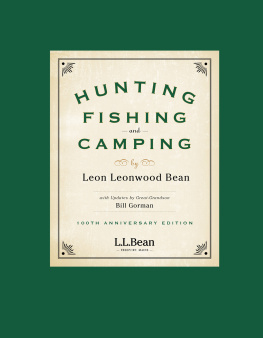More praise for Bill Heavey and
If You Didnt Bring Jerky, What Did I Just Eat?
Sure to bring a smile to even the grumpiest person in the land.
Gene Mueller, The Washington Times
To the list of great Field & Stream essayistsRobert Ruark, Gene Hill, Cory Ford, and Ed Zernadd the name Bill Heavey. His writing is funny, moving, acerbic and, best of all, always alert to the absurdities of life. This is a book that will be read and reread for years and probably for generations.
Patrick F. McManus, New York Times best-selling author of The Bear in the Attic and Kerplunk!
In the nebulous genre of outdoor writing, a skilled scribe can blend the dramatic with the mundane, humor with heartache, piety with profanity, and somehow make it all make sense. I know of only a handful who do it well. Bill Heavey is one of them.
Gary Garth, Louisville Courier-Journal (Kentucky)
The Nugent family American Dream quality-of-life campfire is all about the great outdoors and laughter. Bill Heavey is our guide and outfitter for the best of both worlds. His new book delivers wonderful, clever, balls-to-the-wall hysteria celebrating all things fun and frustrating beyond the pavement. When I die, I want Heavey to gut me, stuff me, and deliver my eulogy for one good last laugh. Unfortunately, I will outlive him, laughing all the way. Bill is my favorite writer. That oughta ruin his already teetering career once and for all.
Ted Nugent
If You Didnt Bring Jerky, What Did I Just Eat?
Misadventures in Hunting, Fishing, and the Wilds of Suburbia
Bill Heavey

A note on the title: I made it up. Its just one of several titles I came up with one night. Among others that were rejected: 1) Dont Shoot Until That Deer Finishes Mowing My Lawn; 2) Giant Bucks I Have Missed; and 3) Fifty Ways to Leave Your Tree Stand. In the end, we went with the one in big letters on the opposite page. B.H.
Copyright 2007 by Bill Heavey
Foreword copyright 2007 by David E. Petzal
All rights reserved. No part of this book may be reproduced in any form or by any electronic or mechanical means, or the facilitation thereof, including information storage and retrieval systems, without permission in writing from the publisher, except by a reviewer, who may quote brief passages in a review. Any members of educational institutions wishing to photocopy part or all of the work for classroom use, or publishers who would like to obtain permission to include the work in an anthology, should send their inquiries to Grove/Atlantic, Inc., 841 Broadway, New York, NY 10003.
This book is published by arrangement with Field & Stream magazine, in which the books pieces originally appeared.
Published simultaneously in Canada
Printed in the United States of America
eBook ISBN-13: 978-1-5558-4856-9
Grove Press
an imprint of Grove/Atlantic, Inc.
841 Broadway
New York, NY 10003
Distributed by Publishers Group West
www.groveatlantic.com
For William F. Heavey Jr., 19202007
Whose poet spirit lived
the warrior code:
cheerful always,
always bold
A man knows when he is growing old because he begins to look like his father.
Gabriel Garca Mrquez
Contents
PART I
STALKING IN SLIPPERS: THE NOVICE YEARS
PART II
LYING, HALLUCINATING, AND COVETING GEAR YOU DONT NEED: BECOMING A REAL OUTDOORSMAN
PART III
THE JUNKET JACKPOT: HUNTING AND FISHING AS WORK
PART IV
HUNTING WITHOUT PANTS: AND OTHER NECESSARY SKILLS
PART V
MAKING INCOMPETENCE PAY: THE WELL-SEASONED SPORTSMAN
PART VI
IT TAKES A FREEBIE: FRESHLY RECYCLED BONUS SECTION FOR THE PAPERBACK EDITION
Foreword
Field & Stream magazine has been around for more than a hundred years, and in all that time, there have been only three men who were talented enough to write humor for it on a regular basis.
Ed Zern was a genius who dealt in a kind of wry, detached zaniness that people found irresistible. His Exit Laughing column, which ran on the magazines back page from 1958 until 1994, could have appeared in The New Yorker just as easily as in Field & Stream.
Patrick F. McManus, who now writes the back-page column for Outdoor Life, would rather get a belly laugh than a chuckle. He is the man to see for broad humor. The world he created featured himself as a blundering preteen kid and a regular cast of characters with names such as Rancid Crabtree and Retch Sweeney. It was a spiritual throwback to the 1950s sitcoms where people laughed and no one really got hurt.
Bill Heavey taps into a third type of comedy. It is the variety in which you can see yourself and laugh, or wince, or even cry. Bill is an everyman who may be the most inept sportsman ever to grace the magazines pages. On the other hand, he may simply be the most honest. He mines the very failures we all encounter but that most of us take pains to conceal. In short, his boneheaded mistakes are our boneheaded mistakes. When applied to hunting and fishing, which are largely based on competence, dexterity, and skill, these mistakes are amplified, and the consequences are often severe. If, for example, Bill tells you that he spilled scalding coffee in his crotch while driving to his tree stand before first light, you can bet he has the burns to prove it and will show them to you given half a chance.
This ideathat enthusiasm trumps skillis something of a revolutionary concept in outdoor magazines. Before Heavey, outdoor writers were sunburned Eagle Scout types who were seemingly born with rod and gun in hand and were always successful at their pursuits. They could survive for weeks with nothing but some matches and a box of fishing hooks. Heavey, on the other hand, came to hunting in his late thirties, largely as a way to expand what he could write about. He is neither sunburned nor an Eagle Scout, but he does have the maniacal zeal of the late convert. In recent years he has become obsessed with whitetail deer, which have consistently proven themselves higher on the evolutionary scale than he is.
Unlike say, Ted Trueblood, the famous Field & Stream writer who spent his days in the glorious mountains of southwestern Idaho, Heavey lives in the suburbs of Washington, D.C. He hunts for shed deer antlers in strips of woods loud with the hum of the Beltway, and he fishes for largemouth bass in the Potomac as police boats comb the water for terrorists. It is not a romantic outdoor life, at least not in the conventional sense. Bill works his hunting and fishing schedule around the duties of a modern dad: mowing the lawn; paying the bills; and ferrying his daughter Emma to school, the dentist, play dates, and toy stores. At the same time, he tries to introduce her to the world he loves: learning to stalk by sneaking up on a neighbors mechanical Christmas reindeer, fishing a suburban lake for bluegills, and imitating the calls of doves in the backyard. In other words, he lives like most of us, and perhaps that is why his pieces are so resonant. For him, being at large in the woods for even a few hours is a spiritual journey, and the fact that the enterprise is doomed to failure more often than not is almost incidental. While he may not be in the accelerated class, skills-wise, Heavey has the heart of a true hunter. He knows that the animal is a necessary actor, but that the experience of hunting is the real trophy.
Next page

